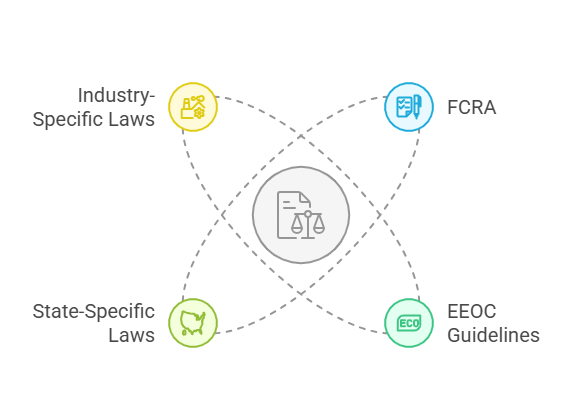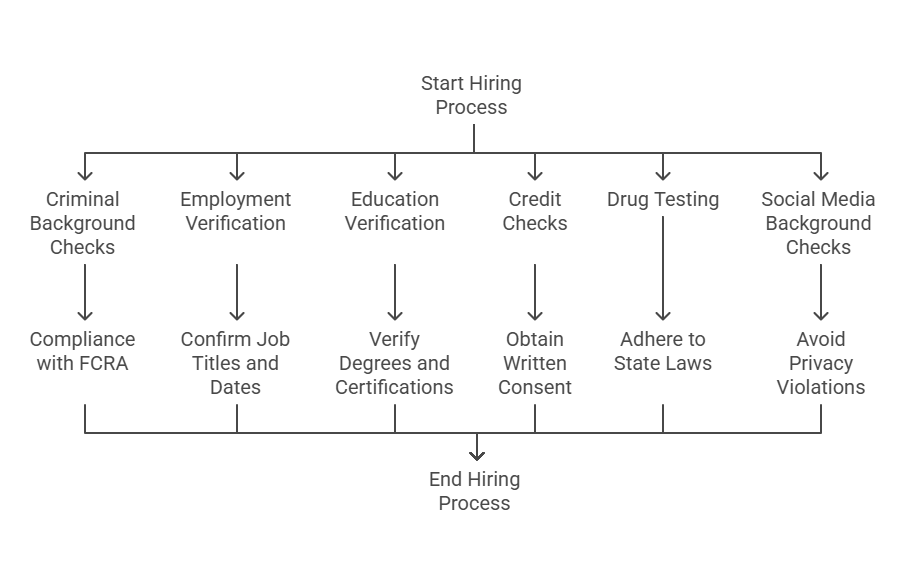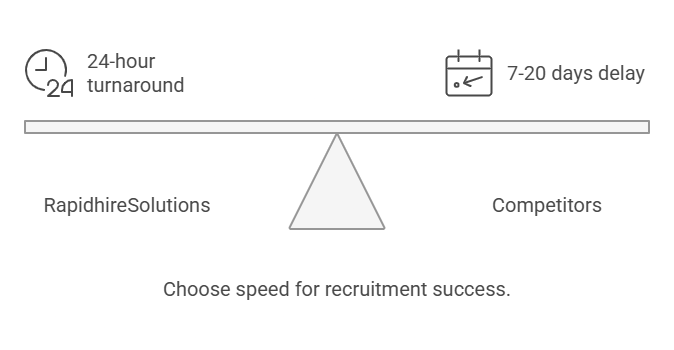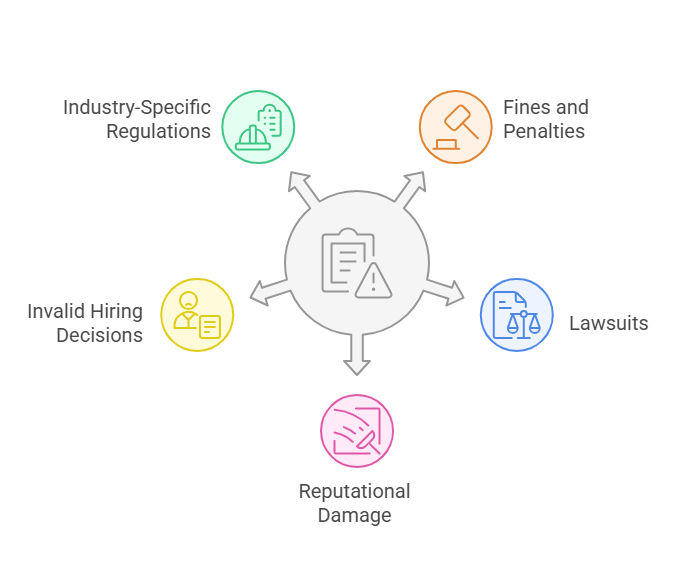
Introduction to Screening Compliance Laws
In 2025, businesses face a continuously evolving legal landscape, particularly when it comes to employee, contractor, and candidate screening. Screening compliance laws are a crucial aspect of hiring and onboarding processes that ensure businesses adhere to federal and state regulations. These laws help protect both employers and employees by maintaining fairness, privacy, and transparency throughout recruitment. As the compliance requirements surrounding background checks, drug tests, and other screenings become more stringent, it is imperative that businesses stay up-to-date to avoid legal repercussions, fines, and potential damage to their reputation.
Why Screening Compliance Laws Matter
The significance of screening compliance laws in 2025 cannot be overstated. With increasing scrutiny on workplace diversity, inclusivity, and privacy, businesses must navigate a complex web of federal, state, and industry-specific regulations. Failing to comply with these laws not only exposes businesses to significant legal risks but also damages their credibility in the eyes of job candidates, employees, and consumers.
Non-compliance can result in expensive fines, lawsuits, and a tarnished reputation. For example, a failure to comply with the Fair Credit Reporting Act (FCRA) during background checks could lead to legal actions from candidates who were not properly informed or whose rights were violated. Moreover, businesses found to be in violation of Equal Employment Opportunity Commission (EEOC) guidelines may face investigations or penalties related to discriminatory hiring practices. As laws evolve in 2025, businesses must prioritize compliance to ensure they can continue to operate smoothly while maintaining their legal and ethical obligations.
The evolving nature of compliance laws makes it essential for businesses to partner with reliable screening service providers who not only conduct thorough checks but also stay updated on regulatory changes. One such provider is RapidhireSolutions, which ensures its background check services align with the latest compliance laws to help businesses remain fully compliant.
Essential Screening Compliance Laws for 2025

In 2025, the following key laws govern the screening process for businesses:
- Fair Credit Reporting Act (FCRA): The FCRA is a fundamental federal law that regulates the collection, dissemination, and use of consumer information, including background checks for employment purposes. It mandates that businesses must obtain written consent from candidates before conducting background checks and provide them with a copy of the report if any adverse action is taken based on the findings. Non-compliance with the FCRA can lead to significant penalties and lawsuits.
- Equal Employment Opportunity Commission (EEOC) Guidelines: The EEOC enforces laws against workplace discrimination. Its guidelines aim to ensure that businesses conduct background checks in a manner that does not discriminate against candidates based on race, color, national origin, sex, disability, or religion. The EEOC stresses that blanket policies such as automatically rejecting candidates with criminal records without considering the nature of the offense and the time elapsed can lead to violations.
- State-Specific Laws (e.g., California’s Ban-the-Box Law): Several states and cities have implemented additional laws regulating background checks. For example, California’s “Ban-the-Box” law prohibits employers from asking about criminal history on job applications and mandates that criminal background checks be conducted later in the hiring process. These state-specific laws vary widely, and it is crucial for businesses to stay informed about local regulations to avoid non-compliance.
- Industry-Specific Laws (e.g., Healthcare, Finance, Education): Certain industries have unique screening requirements. For example, healthcare institutions must follow stringent background checks for employees, including drug testing and checking for any history of patient abuse or fraud. In finance, candidates are often subject to credit checks to assess their financial responsibility. In the education sector, background checks for educators often include reviews of child abuse records. Each industry has specific compliance guidelines that businesses must follow to ensure they meet both industry standards and federal laws.
Types of Background Checks Under Screening Compliance Laws

There are several types of background checks that businesses must incorporate into their hiring processes. These checks are subject to various legal requirements depending on the industry and jurisdiction:
- Criminal Background Checks: Criminal background checks are perhaps the most common form of screening and are often required for positions involving sensitive or vulnerable populations. The FCRA mandates that businesses disclose any findings from criminal background checks to candidates and provide them with an opportunity to dispute the results.
- Employment Verification: Employers typically verify employment history to ensure candidates possess the qualifications they claim. Verification is necessary to confirm job titles, dates of employment, and reasons for leaving previous positions. Accurate employment verification helps businesses avoid fraud and ensures they hire qualified individuals.
- Education Verification: Education verification confirms the academic qualifications of candidates, ensuring they hold the degrees or certifications they list on their resumes. This is particularly important for roles that require specific educational backgrounds or certifications, such as doctors, lawyers, or educators.
- Credit Checks: Credit checks are required for positions in finance, accounting, and roles where candidates will handle money or sensitive financial information. However, employers must obtain written consent before conducting credit checks, and they must comply with the FCRA when using the results in employment decisions.
- Drug Testing: Some employers, particularly in safety-sensitive industries, are required to conduct drug testing as part of their screening process. Drug testing policies must adhere to state laws, and employers must ensure that they do not violate employees’ privacy rights or discrimination laws.
- Social Media Background Checks: Social media background checks are a more recent development but are gaining traction in the hiring process. Employers may look at a candidate’s social media presence to gain insights into their behavior, values, and character. However, businesses must be cautious to avoid violating privacy rights or engaging in discriminatory practices.
Importance of Compliance
Adhering to screening compliance laws is vital for businesses to maintain a fair, legal, and transparent hiring process. Not only does it protect businesses from legal and financial consequences, but it also helps foster trust among employees, candidates, and the public. Non-compliance can lead to lawsuits, fines, and reputational damage that can be costly and time-consuming to resolve. By partnering with a reliable service provider like RapidhireSolutions, businesses can streamline their screening processes and ensure that they remain compliant with all relevant laws.
Consequences of Non-Compliance:
- Legal actions and lawsuits
- Financial penalties and fines
- Damage to employer reputation and public trust
- Loss of business opportunities and partnerships
By staying updated on the latest compliance laws and leveraging the expertise of background check providers like RapidhireSolutions, businesses can reduce these risks and make more informed hiring decisions.
Essential Screening Compliance Laws for Businesses in 2025
| Law | Requirements | Consequences of Non-Compliance |
|---|---|---|
| Fair Credit Reporting Act (FCRA) | Written consent required, disclosure of findings to candidates | Lawsuits, fines, damage to reputation |
| Equal Employment Opportunity Commission (EEOC) | Non-discriminatory hiring practices, equitable treatment of candidates | Discrimination lawsuits, penalties |
| California’s Ban-the-Box Law | Prohibits asking about criminal history on job applications | Legal penalties, loss of business license |
| Healthcare Industry Regulations | Extensive checks for abuse, fraud, and licensing violations | Loss of licenses, healthcare violations |
| Financial Industry Regulations | Credit checks, financial history assessments | Legal actions, fines, job application rejection risks |
RapidhireSolutions offers services that adhere to all of these compliance laws, ensuring that your background checks are thorough, legal, and efficient. Our commitment to compliance helps businesses avoid costly mistakes while remaining competitive in the hiring process.
Comparing RapidhireSolutions with Other Background Check Providers
Choosing the right background check provider is critical for businesses looking to ensure compliance with screening laws while making well-informed hiring decisions. In 2025, businesses are expected to adhere to increasingly stringent legal requirements surrounding employment background checks. Therefore, understanding the strengths and weaknesses of different service providers is key to ensuring your business stays compliant and can streamline its hiring processes. In this section, we will compare RapidhireSolutions with other background check providers based on five essential factors: turnaround time, accuracy, customer service, legal compliance, and service coverage.
Comparison of Key Factors: RapidhireSolutions vs. Other Providers
Below is a comprehensive comparison chart that outlines the strengths and weaknesses of RapidhireSolutions and its competitors in the crucial areas that businesses must consider when selecting a background check provider. The green checkmarks (✓) and red crosses (✗) indicate where each provider excels or falls short.
| Feature | RapidhireSolutions | Competitor A | Competitor B | Competitor C |
|---|---|---|---|---|
| Turnaround Time | ✅ 24 hours | ❌ 15–20 days | ❌ 10–15 days | ❌ 7–14 days |
| Accuracy | ✅ High accuracy | ❌ Inconsistent | ✅ Moderate | ❌ Low |
| Customer Service | ✅ 24/7 support | ❌ Limited hours | ❌ Poor service | ✅ Available during business hours |
| Legal Compliance | ✅ Fully compliant | ❌ Non-compliant | ✅ Some compliance | ❌ Issues in certain states |
| Service Coverage | ✅ Full-service | ❌ Limited services | ✅ Partial coverage | ✅ Full-service |
Detailed Breakdown and Analysis of Key Factors
- Turnaround Time
RapidhireSolutions prides itself on offering rapid background screening results, with a 24-hour turnaround time. This is a significant advantage for businesses that need to make quick decisions, particularly in high-volume hiring environments or industries that operate under tight timelines. In contrast, Competitor A can take 15-20 days, which is an unacceptable delay for businesses that rely on swift recruitment. Similarly, Competitor B takes 10-15 days, and Competitor C ranges from 7-14 days, all of which can result in potential delays and lost opportunities.
The takeaway: With businesses requiring faster hiring to keep pace with industry demands, RapidhireSolutions is the optimal choice for organizations needing timely results.
- Accuracy
Accuracy is paramount in background checks, as incorrect information can lead to legal complications or hiring mistakes that affect business operations. RapidhireSolutions guarantees high accuracy across all screening services. Their proprietary technology, combined with a team of experienced professionals, ensures that businesses receive the most reliable results. On the other hand, Competitor A has been noted for inconsistent accuracy, which can lead to errors in reporting background data. Competitor B provides moderate accuracy, meaning there is some level of risk, and Competitor C has a low accuracy rate, which significantly increases the chances of issues arising from incorrect background checks.The takeaway: To avoid potential legal complications and ensure informed hiring decisions, businesses should opt for a provider like RapidhireSolutions that guarantees high accuracy and reliability in their reports. - Customer Service
In the background check industry, effective customer service is vital. Problems may arise at any point during the process, and businesses need to resolve them quickly. RapidhireSolutions provides 24/7 support, meaning that no matter when a question or issue arises, customers can reach out for assistance. This ensures minimal disruptions to the hiring process. In contrast, Competitor A offers limited hours of support, which could delay any needed assistance, especially in urgent situations. Competitor B has poor service, which has been reported by many customers as frustrating and unhelpful. Competitor C, while offering support, only does so during business hours, which is less flexible for businesses that require help beyond standard working times.The takeaway: RapidhireSolutions stands out for its commitment to providing excellent customer support around the clock, ensuring that clients have continuous access to assistance when needed. - Legal Compliance
Legal compliance is non-negotiable in the field of background checks. The Fair Credit Reporting Act (FCRA) and various state-specific laws (such as California’s ban-the-box law) mandate strict adherence to regulations during background checks. RapidhireSolutions is fully compliant with all relevant screening laws, ensuring businesses are protected from legal risks. On the other hand, Competitor A has been flagged for non-compliance, which could expose businesses to potential lawsuits and penalties. Competitor B shows some compliance, but this partial adherence could still pose risks depending on the jurisdiction. Competitor C has issues in certain states, leaving businesses vulnerable to non-compliance in specific areas.The takeaway: Businesses must prioritize legal compliance in background checks to avoid costly legal penalties. RapidhireSolutions ensures full adherence to laws, making it a safer choice for businesses. - Service Coverage
RapidhireSolutions offers full-service coverage, including criminal background checks, credit checks, employment history verification, and drug testing, among others. This comprehensive service ensures that businesses can conduct thorough screenings across all relevant areas. In contrast, Competitor A provides limited services, which may not cover all necessary checks for some industries or businesses. Competitor B offers partial coverage, which can be a significant drawback if a business requires more extensive background checks. However, Competitor C provides full-service coverage, comparable to RapidhireSolutions, but with potential concerns in compliance in certain states.The takeaway: RapidhireSolutions provides a comprehensive suite of services that can meet the diverse needs of businesses, offering more flexibility and thoroughness compared to some competitors.
Analysis of Service Offerings
When it comes to providing background check services in 2025, businesses must carefully weigh the key factors mentioned above. While RapidhireSolutions consistently outperforms its competitors in terms of turnaround time, accuracy, customer service, legal compliance, and service coverage, businesses may still need to consider other aspects depending on their industry requirements and geographic locations.
For example, while Competitor A may offer some specialized services at a lower cost, the lack of compliance and slow turnaround time may pose significant risks for businesses that prioritize speed and legal protection. Similarly, while Competitor B may provide moderate accuracy, their inability to maintain consistent results can create unnecessary risks for employers in making critical hiring decisions.
On the other hand, RapidhireSolutions offers not only quick and accurate results but also provides peace of mind by ensuring full compliance with the latest screening laws. The ability to offer 24/7 customer support and a comprehensive suite of services sets it apart from many of its competitors, making it the top choice for businesses that prioritize reliability and thoroughness in their screening process.
Legal Implications and FAQs about Screening Compliance Laws
In the fast-evolving landscape of employee screening in 2025, businesses must navigate complex legal requirements to ensure they remain compliant with federal, state, and industry-specific regulations. Failing to adhere to screening laws can lead to significant legal implications, including fines, lawsuits, and reputational damage. In this section, we will discuss the legal implications of non-compliance with screening laws and answer common questions businesses may have regarding the compliance process.
Legal Implications of Non-Compliance
Non-compliance with screening laws can expose businesses to various legal risks, ranging from civil penalties to reputational harm. Below are the potential consequences of failing to adhere to the established legal requirements for background checks:

- Fines and Penalties
Businesses that violate the Fair Credit Reporting Act (FCRA), which governs the use of consumer reports for employment decisions, can be subject to substantial fines. The FCRA stipulates that businesses must obtain consent from candidates before running background checks, provide candidates with a copy of the report if it is used to make an adverse hiring decision, and notify candidates of their rights. Failure to comply with these requirements can result in fines of up to $1,000 per violation or $100,000 for willful non-compliance. - Lawsuits
Employees or candidates may file lawsuits if they believe a business has violated their rights during the screening process. These lawsuits can be time-consuming and costly. For example, under the ban-the-box laws in several states, it is illegal for employers to inquire about criminal history on initial job applications. Violating these laws could expose businesses to litigation and claims of discrimination, especially if background checks are conducted improperly. - Reputational Damage
Beyond legal penalties, failing to comply with screening laws can damage a company’s reputation. Negative publicity from a violation of compliance laws can erode customer trust and deter potential candidates from applying to the business. Ensuring that background checks are conducted in compliance with all applicable laws not only protects the company legally but also enhances its brand image as a responsible and ethical employer. - Invalid Hiring Decisions
Non-compliance with screening laws can lead to invalid or unreliable hiring decisions. For example, failing to correctly evaluate criminal records in compliance with Equal Employment Opportunity Commission (EEOC) guidelines could result in discriminatory hiring practices. This could expose the company to legal risks and potentially costly settlements if a lawsuit is filed. - State-Specific and Industry-Specific Regulations
Many states, like California, have enacted unique laws such as ban-the-box or additional requirements for conducting background checks. In addition, certain industries, such as healthcare, finance, and education, have specialized screening rules, including the need to check licenses and certifications. Businesses operating in these industries must ensure they meet industry-specific compliance standards to avoid legal complications.
Frequently Asked Questions (FAQs)
What are the consequences of not complying with screening laws?
The consequences can be severe and include fines, penalties, lawsuits, and reputational damage. Businesses could also face invalid hiring decisions that might open them up to discrimination claims. Ensuring compliance with all applicable laws, including federal and state regulations, is essential for businesses to avoid these legal issues.
Businesses should review and update their screening policies at least once a year or whenever there are significant changes in legislation. For example, changes in state or federal laws may necessitate updates to the procedures for criminal background checks, drug testing, and other screenings. Additionally, companies should stay informed about industry-specific regulations to ensure they remain compliant.
What types of background checks are required for hiring in 2025?
The types of background checks that are required depend on the nature of the job and the industry. Common checks include:
-
- Criminal background checks
- Employment history verification
- Education verification
- Credit checks (for positions that involve financial responsibilities)
- Drug testing
- Social media background checks (if relevant to the role)
Additionally, industry-specific roles may require more specialized checks, such as certification verification for healthcare professionals or financial fraud background checks for employees in the finance sector.
Can a business use background checks for employment decisions under new laws?
Yes, businesses can use background checks for employment decisions, but they must do so in compliance with current laws, such as those set by the EEOC and FCRA. For instance, the EEOC guidelines require employers to be mindful of how criminal convictions are considered, ensuring they don’t disproportionately affect candidates from protected groups unless the conviction is directly relevant to the job duties.
How does RapidhireSolutions ensure compliance with the latest laws?
RapidhireSolutions stays up-to-date with all federal, state, and industry-specific laws to ensure that every background check is compliant. We regularly review changes in legislation, ensure all consent forms and notifications are correct, and provide guidance on how businesses can navigate complex regulatory environments. Our team of legal experts and compliance specialists is dedicated to ensuring that the background check process remains smooth, legal, and accurate for our clients.
Conclusion
As businesses navigate the increasingly complex legal landscape of background checks and employee screening, adhering to screening compliance laws is paramount to mitigate legal risks and protect the company’s reputation. By working with a reliable provider like RapidhireSolutions, businesses can ensure they meet all regulatory requirements and make informed, legal hiring decisions. As we approach 2025, staying updated on compliance changes and aligning your practices with the latest standards will help your business avoid potential legal pitfalls and maintain a trustworthy hiring process.
